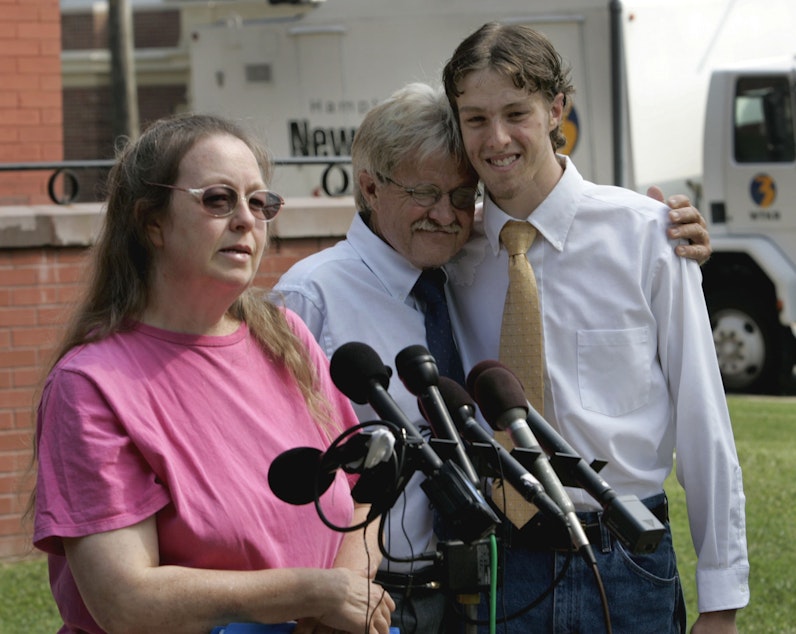Can Teens Refuse Life-Saving Care? Depends On The State

Teens as young as 12 can make their own medical decisions in certain states.
That’s because of the mature minor doctrine. The doctrine allows teens to get abortions, mental health care and drug treatment without their parents’ permission.
But the doctrine has a flip side: What happens when teens refuse care that would save their lives? Just two states, Illinois and Massachusetts, explicitly allow teens to refuse care.
Main story: When A 14-Year-Old Chooses To Die Because Of Religion, Can Anyone Stop Him?
But Washington state is believed to be the only state where a child has died after being allowed to refuse care.
Sponsored
The boy’s name was Dennis Lindberg, and he was in eighth grade in Mount Vernon, Washington. His death brought into focus how little guidance the mature minor rule provides to doctors and judges.
King County’s Department of Health has a checklist for health providers to consider in these rare cases: Does the teenager live away from his parents and manage his own affairs? Does the teen appear intelligent? Mature? Conduct himself as an adult? Is the minor married?
The mature minor doctrine finds its roots in Washington state. In 1967, a judge in Olympia ruled that an 18-year-old could make his own medical decision. At the time, the age of majority was 21.
Other states went on to enact mature minor laws and rules, but they weren’t standardized. That has led medical ethicists to argue that maturity is too subjective. Being married as a child, for example, doesn’t necessarily denote maturity.
In 1996, a law student wrote in the DePaul Law Review that she worried the rule would eventually result in a child’s death.
Sponsored
“It is crucial that courts develop a rational definition of ‘maturity’ and apply it consistently,” the student, Jessica Penkower, wrote.
“Many courts, without further elaboration, simply announce that minors are mature if they can understand the nature of their decisions. But how do minors demonstrate that they understand the nature of their decision?”
Penkower noted the case of Ernestine Gregory, a 17-year-old Jehovah’s Witness who had leukemia. Gregory, who lived in Illinois, had refused blood transfusions, because Jehovah’s Witnesses believe that accepting blood violates the Bible.
In 1989, an Illinois judge later ruled in Gregory’s favor, saying that she was mature enough to make her own medical decisions. Gregory’s health had improved by the time the judge made his ruling; records show that she currently lives on Chicago’s South Side.
More recently, a 16-year-old named Starchild Abraham Cherrix, also prevailed in time. Cherrix, who lived in Virginia, said he wanted to stop chemotherapy and try alternative medicine. By supporting him, his parents faced charges of medical neglect.
Sponsored
The Virginia legislature ultimately supported his family and in 2007 enacted “Abraham’s Law.” That allows parents to refuse medical treatment for children aged 14 to 17 with a life-threatening medical condition – if the teen is mature enough to understand the outcome.
Elsewhere, though, minors have been denied this right.
The year before Dennis Lindberg died, a similar case went before a judge in Portland, Oregon.
A 17-year-old Jehovah’s Witness had been diagnosed with lymphoblastic leukemia. Doctors at Oregon Health Sciences University asked a judge to allow them to force the boy to take blood transfusions.
A juvenile court judge rejected the boy’s claim that he was a mature minor. The judge noted the court’s "obligation is to enforce the laws of this state, and the law in this state is that somebody under the age of 18 is a minor and therefore does not have the legal capacity to make this kind of a medical decision."
Sponsored
When judges and doctors discuss the mature minor rule, they often refer to a 1982 study by Lois Weithorn. Dennis Lindberg’s doctor mentioned this study in his testimony in 2007.
Weithorn, then a graduate student at the University of Pittsburgh, found that 14-year-olds don’t differ from adults when making medical decisions.
Reached this summer, Weithorn, now a law professor at UC Hastings College of the Law, said her study shouldn’t be relied on as a primary source of evidence for children who are gravely ill.
She had asked kids to consider diabetes, depression and epilepsy – not life or death. Her research had not taken the effect of religion on children's decisions.
“My study couldn’t be extended to other populations,” Weithorn said. “I wasn’t going to put certain very sensitive scenarios in there because parents probably wouldn’t have agreed for the kids to participate in the study.”
Sponsored
Weithorn also noted that brain research has evolved to show that – in addition to the cognitive factors she studied – adolescents could be influenced by friends.
Dr. Douglas Diekema at Seattle Children’s Hospital made this point after Dennis Lindberg’s death. Although he didn’t treat Dennis, Diekema debriefed his care team after he died.
Diekema said Weithorn’s study shows that teenagers can behave rationally – in a sterile environment.
“It only recognizes the rational side of the brain, not the emotional side,” he said of the study. In the last 10 to 15 years, he said science has found that “the majority of our decision-making is driven by the socio-emotional side of our brain.”
Diekema said teenagers can appear mature but not understand the consequences of their actions.
“Adolescent boys in the wilderness, surrounded by their peers – they’ll dance on the edge of a cliff,” Diekema said. “In a classroom they would say, ‘I would never do it.’ But they do.”

